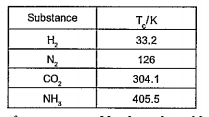An ideal gas obeying kinetic theory of gases can be liquified, if
(a)Its temperature is more than critical temperature
T
c
(b)Its pressure is more than critical pressure
P
c
(c)Its pressure is more than
P
c
at a temperature less than
T
c
(d)It cannot be liquified at any value of P and TSolution in Malayalam
Its temperature is more than critical temperature Tc
Its pressure is more than critical pressure Pc
Its pressure is more than Pc at a temperature less than Tc
It cannot be liquified at any value of P and T
The correct Answer is:D
Ideal gas has no force of attraction and has no volume for molecules. Hence, it cannot be liquified at any T and P.
Similar Questions
The critical temperature of hydrogen gas is 33.2^(@)C and its critical pressure is 12.4 atm. Find out the values of a' and b' for the gas.
View SolutionThe critical temperature of hydrogen gas is 33.2^(@)C and its critical pressure is 12.4 atm. Find out the values of a' and b' for the gas.
View SolutionThe critical temperature of hydrogen gas is 33.2∘C and its critical pressure is 12.4 atm. Find out the values of a'andb' for the gas.
View SolutionThe critical temperature of hydrogen gas is 33.2∘C and its critical pressure is 12.4 atm. Find out the values of a'andb' for the gas.
View SolutionThe temperature of a gas at pressure P and volume V is 27∘C. Keeping its volume constant. If its temperature is raised to 927∘C, then its pressure will be
View SolutionAt which of the following conditions can a gas be liquified? Tc and Pc are critical temperature and pressure.
View SolutionFor an adiabatic process of an ideal monatomic gas, the pressure and temperature are related as P prop T^c . Find out the value of C.
View SolutionCritical temperature of some substance are given below:
It is not possible to liquify CO2 gas above 31.1^@C by applying pressure. Why ?
View Solution